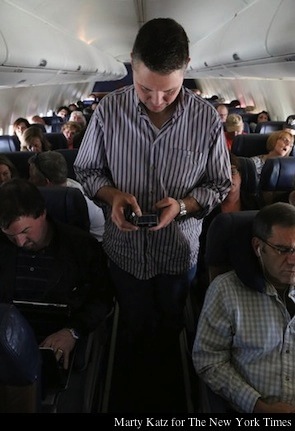- Home
- Internet
- Internet News
- Craving Wi Fi, preferably free and really fast
Craving Wi-Fi, preferably free and really fast
By Susan Stellin, The New York Times | Updated: 1 May 2013 15:39 IST

Click Here to Add Gadgets360 As A Trusted Source

Advertisement
Travelers hitting the road with their mobile electronic devices have three questions about staying connected away from home: will there be Wi-Fi, how much will it cost and how well will it work?
Increasingly, it is that last question that matters most.
Hotels, airports and airlines are struggling to keep up with customers streaming movies on their tablets and hosting online meetings on their laptops, with varying degrees of success. While hoteliers and airport authorities have been fighting the bandwidth battle for years, airlines are still installing Wi-Fi on many aircraft and are already confronting challenges.
Travelers who want Wi-Fi in the air cannot always tell if a plane will have Internet service when they book their tickets. Prices for service are still evolving, and the quality of the connection does not come close to matching what most people are used to on the ground.
"No matter what the system is, none of them right now are showing the ability to keep up with passenger demand," said Mary Kirby, editor in chief of Airline Passenger Experience magazine. "I've heard complaints about every single system."
Acknowledging the technical hurdles involved in delivering Internet service to a plane traveling 500 miles an hour, Ms. Kirby said airlines and their connectivity partners needed to better manage passenger expectations.
"It's time for the industry to say, 'Here's reasonably what you can expect, and it's not an at-home experience,' " she said. "A passenger should expect to be able to use social media and check e-mail. But you're not going to be able to send e-mails with really big files, and you're not going to be able to stream video."
A new Web site, Routehappy.com, is helping travelers find out if a flight has Wi-Fi - information many airlines do not reveal until after a ticket is booked. Routehappy lets travelers search for flights on a particular route, like New York to San Francisco, then sort the results based on various "happiness factors," including whether the flight offers Wi-Fi.
For a weekday in mid-April, Routehappy calculated that 24 percent of domestic flights offered Wi-Fi, 56 percent did not and 20 percent might. John Walton, Routehappy's director of data, says the "maybe" category reflects the fact that airlines are busy installing this technology, so it is not always possible to determine weeks in advance if a flight will have it or how well it will work.
"You never know how many other people are going to be using Wi-Fi at the same time," Mr. Walton said.
Airlines and Wi-Fi providers say typical demand is 5 to 10 percent of passengers, but use is often higher on longer flights. On Virgin America, which offers Wi-Fi on all its planes, 20 percent of passengers typically log on, said Abby Lunardini, a company spokeswoman, and more than a third use Wi-Fi on transcontinental routes.
Most carriers use an air-to-ground system provided by Gogo, which relies on a network of ground-based cellular towers to communicate with aircraft flying across the United States. Gogo's system can deliver Internet speeds of 3.1 to 9.8 megabits per second, usually much slower than a typical home connection.
Looking to address these speed limitations, Gogo and other Wi-Fi providers are moving toward satellite-based systems capable of delivering faster Internet service. Satellite systems also work over the ocean, enabling carriers to offer Wi-Fi on international flights.
American Airlines has international Wi-Fi on its Boeing 777-300ER aircraft, which fly between Dallas or New York and London, and between New York and Sao Paulo, Brazil. United Airlines also offers Wi-Fi service on some international flights but does not specify which routes.
Delta is considered a leader on the Wi-Fi front in the United States, providing Internet service on more than 800 aircraft, including many regional jets. American has about 450 Wi-Fi-equipped planes, Southwest Airlines more than 400 and United 50. JetBlue plans to introduce a satellite-based Internet service this year, promising faster speeds than its competitors offer - and at least basic Wi-Fi free.
The cost of in-flight Wi-Fi is still all over the map, as carriers figure out what customers are willing to pay. Southwest has taken a simple approach, charging $8 for a daylong Wi-Fi pass; other airlines charge fees based on the length of the flight, the connection time and the device. It can cost just $2 to connect with a smartphone for 30 minutes, or $4.95 to $21.95 a flight for a laptop.
But some fliers simply will not pay to log on.
"What we're seeing is a reluctance to pay," said Ms. Kirby of Airline Passenger Experience magazine, "which is quite fascinating because these systems cost a lot of money on aircraft."
Airports and hotels are confronting a similar situation. Of the 10 busiest airports in the United States, those in Los Angeles, Dallas/Fort Worth, Denver, San Francisco, Las Vegas, Phoenix and Charlotte, N.C., offer at least some free Wi-Fi service.
But the trade-off can be overloaded networks that frustrate passengers, which is why Hartsfield-Jackson Atlanta International Airport - the busiest in the United States - is upgrading its infrastructure before switching to free Wi-Fi this year.
"Our system wasn't built to accommodate the number of customers we expect to have with the free Wi-Fi," said Myrna White, a spokeswoman for the airport, which dropped its Wi-Fi fee to $4.95 a day last fall.
Recognizing the challenge airports and other public locations face, the Federal Communications Commission is working to increase the amount of unlicensed spectrum available for Wi-Fi, which is how passengers at a busy terminal connect to the airport's broadband service.
"What we have proposed is to provide more space on the airwaves to accommodate the growth of Wi-Fi," said Julius P. Knapp, chief of the F.C.C.'s office of engineering and technology. "That translates to faster data speeds and reduced congestion."
Free Wi-Fi, at least for basic Internet service, is also becoming the norm at hotels, particularly at less expensive ones. According to the American Hotel and Lodging Association, 23 percent of hotels in the United States charge for in-room Internet access. This week, the hospitality site HotelChatter.com released its annual Wi-Fi report, finding that two-thirds of hotels offered free Internet access, at least in the lobby. Luxury hotels are still more likely to charge than midrange or budget hotels.
Mark G. Johnson, HotelChatter's founder, said guests' top complaints were hotels that charged a separate Internet fee for each device, like a tablet and a laptop, and those that offered inadequate support when the network was having problems.
"What I'm hearing more is that people at the front desk almost throw their hands in the air," Mr. Johnson said. "They may give you back your money, but they can't help you."
Some travelers bring their own backup Wi-Fi, in case the hotel's Internet service is spotty.
David J. Danto, a consultant with Dimension Data, says he travels with a portable MiFi hot spot from Sprint, which he uses if a hotel's Wi-Fi service is slow. Although he says he does not mind paying for Wi-Fi if it works well, he has little patience for hotels that blame network outages on high demand.
"If everybody flushes the toilet at the same time, you wouldn't want the building to come down," Mr. Danto said. "I'm not sure why they wouldn't design the Internet service the same way."
© 2013, The New York Times News Service
Increasingly, it is that last question that matters most.
Hotels, airports and airlines are struggling to keep up with customers streaming movies on their tablets and hosting online meetings on their laptops, with varying degrees of success. While hoteliers and airport authorities have been fighting the bandwidth battle for years, airlines are still installing Wi-Fi on many aircraft and are already confronting challenges.
Travelers who want Wi-Fi in the air cannot always tell if a plane will have Internet service when they book their tickets. Prices for service are still evolving, and the quality of the connection does not come close to matching what most people are used to on the ground.
"No matter what the system is, none of them right now are showing the ability to keep up with passenger demand," said Mary Kirby, editor in chief of Airline Passenger Experience magazine. "I've heard complaints about every single system."
Acknowledging the technical hurdles involved in delivering Internet service to a plane traveling 500 miles an hour, Ms. Kirby said airlines and their connectivity partners needed to better manage passenger expectations.
"It's time for the industry to say, 'Here's reasonably what you can expect, and it's not an at-home experience,' " she said. "A passenger should expect to be able to use social media and check e-mail. But you're not going to be able to send e-mails with really big files, and you're not going to be able to stream video."
A new Web site, Routehappy.com, is helping travelers find out if a flight has Wi-Fi - information many airlines do not reveal until after a ticket is booked. Routehappy lets travelers search for flights on a particular route, like New York to San Francisco, then sort the results based on various "happiness factors," including whether the flight offers Wi-Fi.
For a weekday in mid-April, Routehappy calculated that 24 percent of domestic flights offered Wi-Fi, 56 percent did not and 20 percent might. John Walton, Routehappy's director of data, says the "maybe" category reflects the fact that airlines are busy installing this technology, so it is not always possible to determine weeks in advance if a flight will have it or how well it will work.
"You never know how many other people are going to be using Wi-Fi at the same time," Mr. Walton said.
Airlines and Wi-Fi providers say typical demand is 5 to 10 percent of passengers, but use is often higher on longer flights. On Virgin America, which offers Wi-Fi on all its planes, 20 percent of passengers typically log on, said Abby Lunardini, a company spokeswoman, and more than a third use Wi-Fi on transcontinental routes.
Most carriers use an air-to-ground system provided by Gogo, which relies on a network of ground-based cellular towers to communicate with aircraft flying across the United States. Gogo's system can deliver Internet speeds of 3.1 to 9.8 megabits per second, usually much slower than a typical home connection.
Looking to address these speed limitations, Gogo and other Wi-Fi providers are moving toward satellite-based systems capable of delivering faster Internet service. Satellite systems also work over the ocean, enabling carriers to offer Wi-Fi on international flights.
American Airlines has international Wi-Fi on its Boeing 777-300ER aircraft, which fly between Dallas or New York and London, and between New York and Sao Paulo, Brazil. United Airlines also offers Wi-Fi service on some international flights but does not specify which routes.
Delta is considered a leader on the Wi-Fi front in the United States, providing Internet service on more than 800 aircraft, including many regional jets. American has about 450 Wi-Fi-equipped planes, Southwest Airlines more than 400 and United 50. JetBlue plans to introduce a satellite-based Internet service this year, promising faster speeds than its competitors offer - and at least basic Wi-Fi free.
The cost of in-flight Wi-Fi is still all over the map, as carriers figure out what customers are willing to pay. Southwest has taken a simple approach, charging $8 for a daylong Wi-Fi pass; other airlines charge fees based on the length of the flight, the connection time and the device. It can cost just $2 to connect with a smartphone for 30 minutes, or $4.95 to $21.95 a flight for a laptop.
But some fliers simply will not pay to log on.
"What we're seeing is a reluctance to pay," said Ms. Kirby of Airline Passenger Experience magazine, "which is quite fascinating because these systems cost a lot of money on aircraft."
Airports and hotels are confronting a similar situation. Of the 10 busiest airports in the United States, those in Los Angeles, Dallas/Fort Worth, Denver, San Francisco, Las Vegas, Phoenix and Charlotte, N.C., offer at least some free Wi-Fi service.
But the trade-off can be overloaded networks that frustrate passengers, which is why Hartsfield-Jackson Atlanta International Airport - the busiest in the United States - is upgrading its infrastructure before switching to free Wi-Fi this year.
"Our system wasn't built to accommodate the number of customers we expect to have with the free Wi-Fi," said Myrna White, a spokeswoman for the airport, which dropped its Wi-Fi fee to $4.95 a day last fall.
Recognizing the challenge airports and other public locations face, the Federal Communications Commission is working to increase the amount of unlicensed spectrum available for Wi-Fi, which is how passengers at a busy terminal connect to the airport's broadband service.
"What we have proposed is to provide more space on the airwaves to accommodate the growth of Wi-Fi," said Julius P. Knapp, chief of the F.C.C.'s office of engineering and technology. "That translates to faster data speeds and reduced congestion."
Free Wi-Fi, at least for basic Internet service, is also becoming the norm at hotels, particularly at less expensive ones. According to the American Hotel and Lodging Association, 23 percent of hotels in the United States charge for in-room Internet access. This week, the hospitality site HotelChatter.com released its annual Wi-Fi report, finding that two-thirds of hotels offered free Internet access, at least in the lobby. Luxury hotels are still more likely to charge than midrange or budget hotels.
Mark G. Johnson, HotelChatter's founder, said guests' top complaints were hotels that charged a separate Internet fee for each device, like a tablet and a laptop, and those that offered inadequate support when the network was having problems.
"What I'm hearing more is that people at the front desk almost throw their hands in the air," Mr. Johnson said. "They may give you back your money, but they can't help you."
Some travelers bring their own backup Wi-Fi, in case the hotel's Internet service is spotty.
David J. Danto, a consultant with Dimension Data, says he travels with a portable MiFi hot spot from Sprint, which he uses if a hotel's Wi-Fi service is slow. Although he says he does not mind paying for Wi-Fi if it works well, he has little patience for hotels that blame network outages on high demand.
"If everybody flushes the toilet at the same time, you wouldn't want the building to come down," Mr. Danto said. "I'm not sure why they wouldn't design the Internet service the same way."
© 2013, The New York Times News Service
Comments
Catch the latest from the Consumer Electronics Show on Gadgets 360, at our CES 2026 hub.
Further reading:
Internet
Related Stories
Popular on Gadgets
- Samsung Galaxy Unpacked 2025
- ChatGPT
- Redmi Note 14 Pro+
- iPhone 16
- Apple Vision Pro
- Oneplus 12
- OnePlus Nord CE 3 Lite 5G
- iPhone 13
- Xiaomi 14 Pro
- Oppo Find N3
- Tecno Spark Go (2023)
- Realme V30
- Best Phones Under 25000
- Samsung Galaxy S24 Series
- Cryptocurrency
- iQoo 12
- Samsung Galaxy S24 Ultra
- Giottus
- Samsung Galaxy Z Flip 5
- Apple 'Scary Fast'
- Housefull 5
- GoPro Hero 12 Black Review
- Invincible Season 2
- JioGlass
- HD Ready TV
- Laptop Under 50000
- Smartwatch Under 10000
- Latest Mobile Phones
- Compare Phones
Latest Gadgets
- OnePlus Turbo 6V
- OnePlus Turbo 6
- Itel Zeno 20 Max
- OPPO Reno 15 Pro Mini 5G
- Poco M8 Pro 5G
- Motorola Signature
- Vivo Y50e 5G
- Vivo Y50s 5G
- Lenovo Yoga Slim 7x (2025)
- Lenovo Yoga Slim 7a
- Realme Pad 3
- OPPO Pad Air 5
- Xiaomi Watch 5
- Huawei Watch 10th Anniversary Edition
- Acerpure Nitro Z Series 100-inch QLED TV
- Samsung 43 Inch LED Ultra HD (4K) Smart TV (UA43UE81AFULXL)
- Asus ROG Ally
- Nintendo Switch Lite
- Haier 1.6 Ton 5 Star Inverter Split AC (HSU19G-MZAID5BN-INV)
- Haier 1.6 Ton 5 Star Inverter Split AC (HSU19G-MZAIM5BN-INV)
© Copyright Red Pixels Ventures Limited 2026. All rights reserved.

















